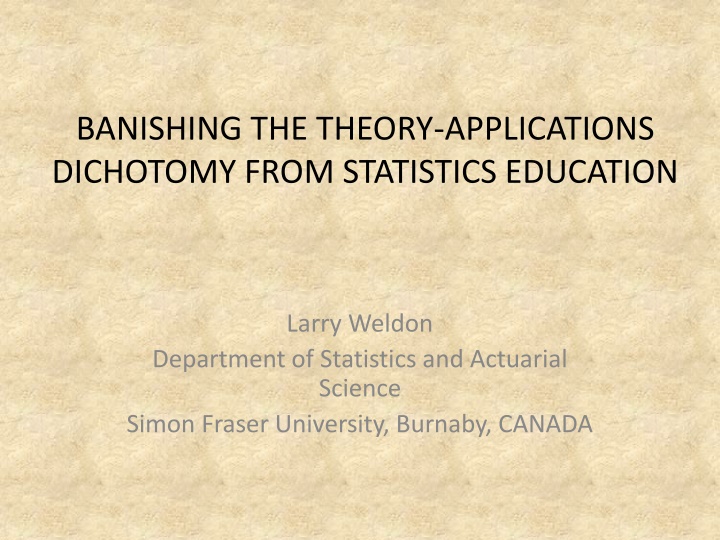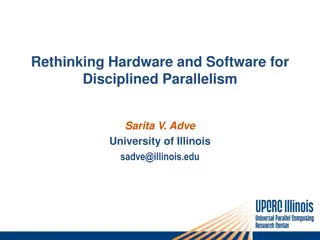
Banishing the Theory-Applications Dichotomy in Statistics Education
Explore the discussion on whether Mathematical Statistics equates to the Theory of Statistics, differentiating between experts, practitioners, and generalists in stats education. Delve into the motivation behind practitioner groups, undergrad course sequences, and implications for stats instructors. Discover the significance of understanding concepts beyond mathematics in statistical studies.
Download Presentation

Please find below an Image/Link to download the presentation.
The content on the website is provided AS IS for your information and personal use only. It may not be sold, licensed, or shared on other websites without obtaining consent from the author. If you encounter any issues during the download, it is possible that the publisher has removed the file from their server.
You are allowed to download the files provided on this website for personal or commercial use, subject to the condition that they are used lawfully. All files are the property of their respective owners.
The content on the website is provided AS IS for your information and personal use only. It may not be sold, licensed, or shared on other websites without obtaining consent from the author.
E N D
Presentation Transcript
BANISHING THE THEORY-APPLICATIONS DICHOTOMY FROM STATISTICS EDUCATION Larry Weldon Department of Statistics and Actuarial Science Simon Fraser University, Burnaby, CANADA
? ? Issue Questions Is Mathematical Statistics = Theory of Statistics? Expert vs Practitioner vs Generalist different stats education? Motivation for practitioner grps? What undergrad course sequences? for practitioners for experts Motivation for Stats Instructors? Implications for Stats Course Taxonomy
? ? Some Questions Is Mathematical Statistics = Theory of Statistics? Expert vs Practitioner vs Generalist different stats education? Motivation for practitioner grps? What undergrad course sequences? for practitioners for experts Motivation for Stats Instructors?
Basic Theory: More than Math? Obs Study vs Experiment Distributions: Averages and Variability Random Sampling, Estimation Independence (and dependence) Time Series Statistical Significance
Example: Dependence When does a portfolio of stocks have enough independence to provide stability of return? One needs to understand the dependence-independence concept A & B independent -> P(A&B)=P(A)*P(B) is not enough
Basic Theory: More than Math? Obs Study vs Experiment Distributions: Averages and Variability Random Sampling, Estimation Independence (and dependence) Time Series Statistical Significance Theory = Generally Applicable Concepts (Much more than Mathematics)
? ? Question Answered? Is Mathematical Statistics = Theory of Statistics? No! Theory is Generally Applicable Concepts. More Questions ->
? ? Some Questions Is Mathematical Statistics = Theory of Statistics? Expert vs Practitioner vs Generalist different stats education? Motivation for practitioner grps? What undergrad course sequences? for practitioners for experts Motivation for Stats Instructors?
Levels of Expertise Generalist requires stats appreciation Practitioner requires stats appreciation requires stats methods & hazards requires exposure to expert capability Expert all the above and much more Cumulation Model of Statistics Education
Do Practitioners need Appreciation Course? Overview for when-to-consult Motivation to integrate with applied focus Awareness of na ve user (hazards)
Experts need stats appreciation? Yes, because they need informed choice of career Real expert statisticians are generalists as well as specialists, so they can absorb context Need to explain to na ve user
Experts need Practitioner training? of course! early exposure helps education no need to learn everything the hard way Proposed Course Sequence: Appreciation -> Practitioner -> Expert Questions ->
? ? Some Questions Is Mathematical Statistics = Theory of Statistics? Expert vs Practitioner vs Generalist different stats education? Motivation for practitioner grps? What undergrad course sequences? for practitioners for experts Motivation for Stats Instructors?
Motivation Clusters? Does auto engine size or golf participation interest biologists? Does potato pest resistance or threatened species of birds interest social scientists? Contextual Interest is Important for Seeking Data-Based Information
Stats Streams for Major Groups? Context Material Matters! Because Context-Major Students chose context! Minimal Context Segregation for Courses General (Wide Focus) Life Science Social Science (segregation by context not by methods introduced) Important for early courses, perhaps not feasible for higher level ones. Questions ->
? ? Some Questions Is Mathematical Statistics = Theory of Statistics? Expert vs Practitioner vs Generalist different stats education? Motivation for practitioner grps? What undergrad course sequences? for practitioners for experts Motivation for Stats Instructors?
Undergrad Course Structure? Statistics 1 (life) Statistics 1 (social) Statistics 1 (general) (Appreciation courses) Statistics 2 (life) Statistics 2 (social) Statistics 2 (general) Statistics 3 (life) Statistics 3 (social) Statistics 3 (general) (Practitioner Courses) Statistics 4 (general) Statistics 5 (general) Statistics 6 (general) (Expert courses) More courses where numbers permit. Note: 1. No specialized technique courses like Nonparametrics, Time Series, Experimental Design, Quality Control, Bayesian Analysis 2. No service stream 3. No baby stat courses Experts need MORE not DIFFERENT
Experiential Learning&Teaching Sequence of Projects data collection data analysis data summary Techniques as Required Concepts as they Arise Example ->
Experiential Learning Examples Sports Leagues probability measures of variability simulation Daily Delivery Schedules censored data (demand exceeds sales) parametric variability, prediction optimization Many concepts and techniques will be introduced Questions ->
Some Questions Is Mathematical Statistics = Theory of Statistics? Expert vs Practitioner vs Generalist different stats education? Motivation for practitioner grps? What undergrad course sequences? for practitioners for experts Motivation for Stats Instructors?
Motivation for Stats Instructors? Case Studies/Projects experiential learning Discussion & Presentations Novelty and Creativity encouraged Active engagement of students and instructors Better Use of Instructor Expertise & Experience
Motivation for Stats Instructors? Case Studies/Projects experiential learning Discussion & Presentations Novelty and Creativity encouraged Active engagement of students and instructors Better Use of Instructor Expertise & Experience
Motivation for Stats Instructors? Case Studies/Projects experiential learning Discussion & Presentations Novelty and Creativity encouraged Active engagement of students and instructors Better Use of Instructor Expertise & Experience
Motivation for Stats Instructors? Case Studies/Projects experiential learning Discussion & Presentations Novelty and Creativity encouraged Active engagement of students and instructors Better Use of Instructor Expertise & Experience
Motivation for Stats Instructors? Case Studies/Projects experiential learning Discussion & Presentations Novelty and Creativity encouraged Active engagement of students and instructors Better Use of Instructor Expertise & Experience
Summary Experiential Learning is Authentic Learning It can be motivating for most students and instructors It can be efficient in reducing the number of courses offered Levels of expertise correspond to number of courses completed (not math level) Downside? Requires instructors with an interest in, and experience with, using statistical theory. Thanks for attending this session. Comments? weldon@sfu.ca


